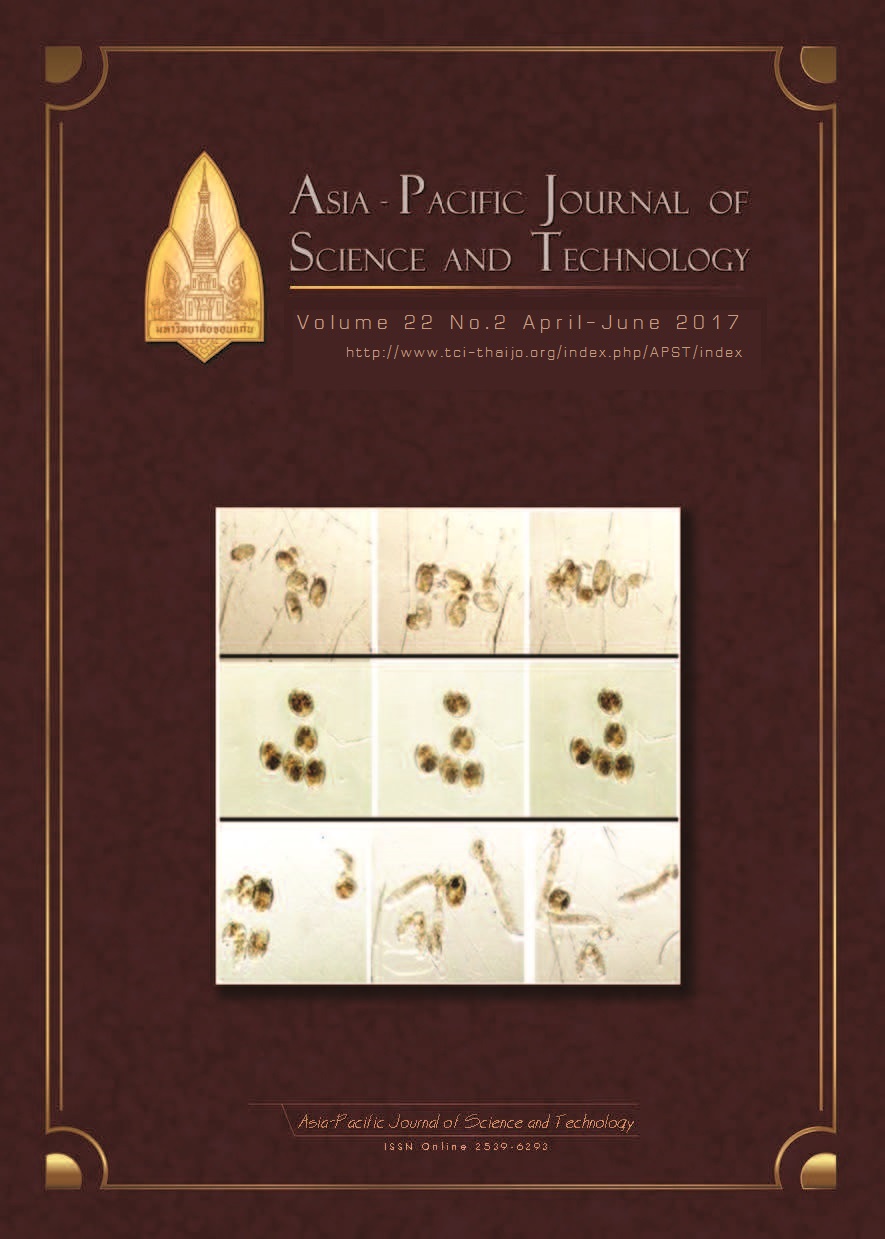Does hypertensive crisis worsen the quality of life of hypertensive patients with OSA?: A pilot study
Main Article Content
Abstract
Background: Obstructive sleep apnea (OSA) is a common cause of hypertension and hypertensive crisis. Quality of life (QOL) of OSA patients is generally poor. This study aimed to evaluate whether hypertensive crisis in OSA patients worsens their QOL.
Methods: Newly diagnosed OSA associated hypertension patients treated at the Hypertension/Sleep Clinic, Srinagarind Hospital, Khon Kaen University were enrolled. The SF-36 questionnaire was distributed to all eligible patients. Patients were categorized into two groups, with and without hypertensive crisis. All domains of QOL compared both groups using a Wilcoxon Rank Sum test.
Results: There were 12 eligible patients who completed the study protocol. The median age of all patients was 51.5 years with median BMI of 33.59 kg/m2. Seven patients were male (58.33%). Three patients had history of hypertensive crisis (25.00%). Baseline characteristics of those with and without hypertensive crisis in terms of OSA symptoms and risk factors were comparable. None of the domains of QOL by the SF-36 were statistically different when comparing the groups.
Conclusion: The QOL of OSA patients with and without hypertensive crisis was comparable.
Article Details
References
[2] Pedrosa, R.P., Drager, L.F., Gonzaga, C.C., Sousa, M.G., de Paula, L.K.G., Amaro, A.C.S., Amodeo, C., Bortolotto, L.A., Krieger, E.M., Bradley, T.D., Lorenzi-Filho, G., 2011. Obstructive sleep apnea: the most common secondary cause of hypertension associated with resistant hypertension. Hypertension (Dallas, Tex.: 1979) 58, 811–817.
[3] Silverberg, D.S., Oksenberg, A., 2001. Are sleep-related breathing disorders important contributing factors to the production of essential hypertension? Current Hypertension Reports 3, 209-215.
[4] Börgel, J., Springer, S., Ghafoor, J., Arndt, D., Duchna, H.-W., Barthel, A., Werner, S., Van Helden, J., Hanefeld, C., Neubauer, H., Bulut, D., Mügge, A., 2010. Unrecognized secondary causes of hypertension in patients with hypertensive urgency/emergency: prevalence and co-prevalence. Clinical Research in Cardiology: Official Journal of the German Cardiac Society 99, 499–506.
[5] Muxfeldt, E.S., Margallo, V.S., Guimarães, G.M., Salles, G.F., 2014. Prevalence and associated factors of obstructive sleep apnea in patients with resistant hypertension. American Journal of Hypertension 27, 1069-1078.
[6] Batool-Anwar, S., Goodwin, J.L., Kushida, C.A., Walsh, J.A., Simon, R.D., Nichols, D.A., Quan, S.F., 2016. Impact of continuous positive airway pressure (CPAP) on quality of life in patients with obstructive sleep apnea (OSA). Journal of Sleep Research 25, 731–738.
[7] Flemons, W.W., Tsai, W., 1997. Quality of life consequences of sleep-disordered breathing. The Journal of Allergy and Clinical Immunology 99, S750-756.
[8] Gall, R., Isaac, L., Kryger, M., 1993. Quality of life in mild obstructive sleep apnea. Sleep 16, S59-61.
[9] Sawanyawisuth, K., Chindaprasirt, J., Senthong, V., Makarawate, P., Limpawattana, P., Domthong, A., Silaruks, S., Chumjan, S., 2013. Lower BMI is a predictor of obstructive sleep apnea in elderly Thai hypertensive patients. Sleep & Breathing = Schlaf & Atmung 17, 1215–1219.
[10] Chobanian, A.V., Bakris, G.L., Black, H.R., Cushman, W.C., Green, L.A., Izzo, J.L., Jones, D.W., Materson, B.J., Oparil, S., Wright, J.T., Roccella, E.J., National Heart, Lung, and Blood Institute Joint National Committee on Prevention, Detection, Evaluation, and Treatment of High Blood Pressure, National High Blood Pressure Education Program Coordinating Committee, 2003. The Seventh Report of the Joint National Committee on Prevention, Detection, Evaluation, and Treatment of High Blood Pressure: the JNC 7 report. JAMA 289, 2560–2572.
[11] Krittayaphong, R., Bhuripanyo, K., Raungratanaamporn, O., Chotinaiwatarakul, C., Chaowalit, N., Punlee, K., Kangkagate, C., Chaithiraphan, S., 2000. Reliability of Thai version of SF-36 questionnaire for the evaluation of quality of life in cardiac patients. Journal of the Medical Association of Thailand = Chotmaihet Thangphaet 83 Suppl 2, S130-136.
[12] Lim, L.L., Seubsman, S.A., Sleigh, A., 2008. Thai SF-36 health survey: tests of data quality, scaling assumptions, reliability and validity in healthy men and women. Health and Quality of Life Outcomes 6, 52.
[13] Banhiran, W., Assanasen, P., Metheetrairut, C., Chotinaiwattarakul, W., 2013. Health-related quality of life in Thai patients with obstructive sleep disordered breathing. Journal of the Medical Association of Thailand 96, 209-216.
[14] Obidoa, C.A., Reisine, S.L., Cheniack, M., 2010. How does the SF-36 perform in healthy populations? A structured review of longitudinal studies. Journal of Social, Behavioral, and Health Sciences 4, 30–48.
[15] Carvalho, M.A., Silva, I.B., Ramos, S.B., Coelho, L.F., Gonçalves, I.D., Figueiredo Neto, J.A., 2012. Quality of life of hypertensive patients and comparison of two instruments of HRQOL measure. Arquivos Brasileiros De Cardiologia 98, 442-451.
[16] Ogunlana, M.O., Adedokun, B., Dairo, M.D., Odunaiya, N.A., 2009. Profile and predictor of health-related quality of life among hypertensive patients in south-western Nigeria. BMC Cardiovascular Disorders 9, 25.


